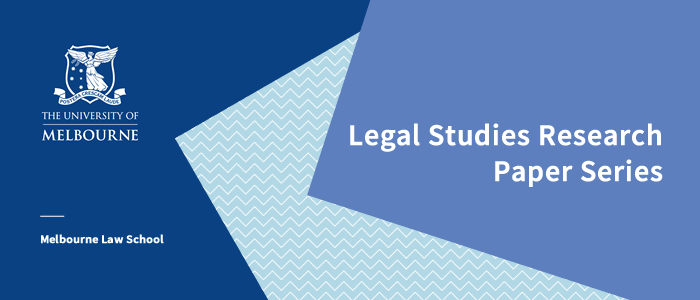Legal Studies Research Paper Series Vol 20, No. 5
Thursday, 26 July 2018

Melbourne Law School published Volume 20 Number 5 of the University of Melbourne Law School Legal Studies Research Paper Series on SSRN.
This issue includes the following articles:
Jason N E Varuhas
Varieties of Damages for Breach of Privacy (783)
This paper offers a comprehensive account of the law of damages within the action for misuse of private information in English law. The paper interrogates which types of damages are and ought to be available for breach of privacy, and the legal rules and principles governing each form of damages including the approach to quantification. In examining the law of damages the paper considers the nature of the emergent privacy action, arguing that it has shed its equitable origins in breach of confidence and now closely resembles 'vindicatory' actions such as false imprisonment, battery and trespass to land. In turn the remedial approach for breach of privacy increasingly follows that adopted within these torts.
Richard Garnett
Precarious Employment? Varying Approaches to Foreign Sovereign Immunity in Labor Disputes (784)
This article examines the recent jurisprudence of the European Court of Human Rights on the issue of state immunity and the right of access to a court in employment disputes. In a series of decisions since Cudak v Lithuania in 2010 the Court has strived to uphold the rights of employees of foreign states, particularly embassy and consular staff engaged in routine, non-policy roles, by limiting the scope of state immunity in such cases. This approach is a welcome affirmation of the right of access to justice.
Alysia Blackham
A Compromised Balance? A Comparative Examination of Exceptions to Age Discrimination Law in Australia and the UK (785)
Exceptions to discrimination law reveal both tensions and telling compromises regarding the boundaries of the equality principle. Drawing on case studies of exceptions to age discrimination law in Australia and the UK, this article considers the normative position on age equality law that emerges from these legal boundaries. It argues that broad exceptions to age discrimination law reflect a deprioritising of age equality, and a preference for the instrumental or economic aims underlying age equality law. The restrictive boundaries of age discrimination law risk undermining the effectiveness of equality law in practice.
Adrienne Stone
Unconstitutional Constitutional Amendments: Between Contradiction and Necessity (786)
The idea of an unconstitutional constitutional amendment is apt to puzzle some constitutionalists. It is thought to involve an inherent paradox or at least to be deeply undemocratic, denying to the people control of their own constitutional future. This idea that, which I will call the ‘contradiction thesis’, is taken to task Unconstitutional Constitutional Amendments. Yaniv Roznai seeks to unscramble these apparent contradictions, to provide a secure theoretical foundation for the idea constitutional unamendability and to resolve its tensions with democracy. This argument is ambitious in its scope and its global comparative reach. Roznai does not limit himself to justifying explicit limitations placed on the power of amendment nor to limitations that go only to process. Rather, Roznai argues that amendment powers are always subject to limitations of substance and procedure and that these limitations may be implicit as well as explicit.
In this short essay argues the Roznai successfully unscrambles the apparent conceptual confusion in the idea of an unconstitutional constitutional amendment. It does not, however, successfully show that the recognition of a doctrine of unamendability, at least in its substantive and implicit forms, is a necessary consequence of constitutionalism. A full justification for a doctrine of unamendability depends, more than Roznai recognises, on the nature of a given constitutional order.
Inbar Levy
Simplifying Legal Decisions: Factor Overload in Civil Procedure Rules (787)
This contribution examines the need to simplify legal decisions. More specifically, this article tackles a situation I refer to as ‘Factor Overload’. Legal rules are sometimes set in the form of ‘Laundry Lists’; that is, long sets of stipulated considerations that the judge must weigh. However, judges may encounter difficulty when trying to implement these checklist clauses. This difficulty is linked to our human cognitive limitations. Behavioural studies demonstrate that people struggle with the task of integrating a large number of factors. In order to test this phenomenon in the legal context, the article presents an investigation based on theoretical discussion, doctrinal analysis and the findings of an original experiment — a preliminary vignette study performed using the factual framework of a real case in which judges had to implement a Laundry List rule. The study uses CPR r 3.9 in England and Wales to demonstrate the unproductive complexity of checklist rules by comparing decisions that have been made when taking into account nine factors, three factors and no factors at all.
Helen Anderson
Shelter from the Storm: Phoenix Activity and the Safe Harbour (788)
A ‘safe harbour carve out’ from insolvent trading liability is intended to encourage directors, particularly of large companies, not to prematurely liquidate financially troubled companies which could be rescued. While the federal government has been successful in introducing this measure, which was part of its 2016 National Science and Innovation Agenda, this article argues that some of the underlying justifications for the safe harbour are flawed and that it may not be effective. A more significant objection is that the safe harbour could lead to a greater prevalence of illegal phoenix activity, sheltering under the appearance of business rescue. The benefit of the liability carve out to the ‘big end of town’ is not worth this risk.